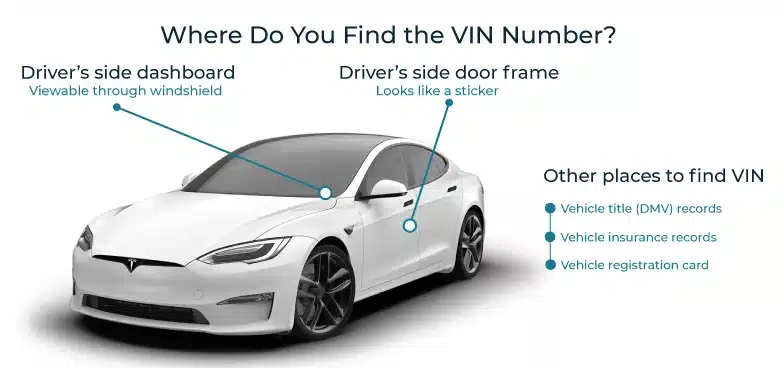
Lincoln Recall Check
Lincoln car owners can now breathe easy thanks to the Lincoln Recalls Check tool by Detailed Vehicle History. Helping you stay up-to-date on potential safety issues and ensuring your Lincoln is running smoothly on the road.
What is a Lincoln Recall?
A Lincoln recall is a safety campaign that requires dealers to inspect or repair a specific defect at no cost, prompted by the manufacturer or the National Highway Traffic Safety Administration (NHTSA).
Why Should You Check the Lincoln Recall History?
Planning to purchase a used Lincoln? Do a recall check first. Using the VIN ensures hidden defects are fixed for free, protecting your safety and budget. Below are some reasons why you should check the recall:
Avoid Unsafe Lincoln
Your Lincoln is built for serene comfort, but no brand is recall-proof. Recalls happen when a Lincoln has a safety defect or doesn’t meet federal standards. Issues can be minor (software) or serious (fire risk). Staying on top of them prevents accidents and gets free dealer repairs.
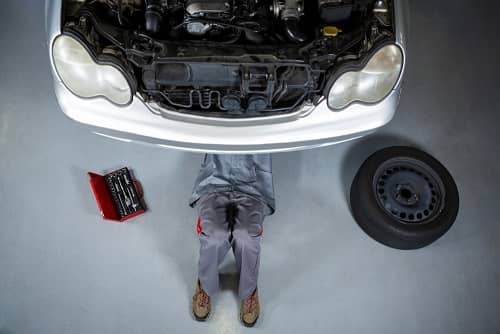
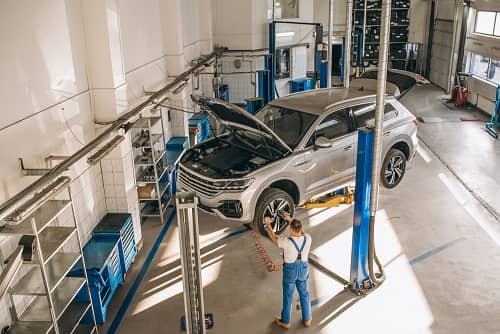
Compliance
Compliance protects your luxury investment. A Lincoln with an unresolved recall may violate federal safety standards, exposing owners and used-car buyers to legal risk and lower resale value. Since manufacturers must fix recall defects at no cost, checking your Lincoln’s history is free insurance against trouble, preventing failed inspections, insurance delays, and buyer skepticism later.
Check Common Safety-Related Issues
Reviewing your Lincoln’s recall history can uncover risks underhood-fire risks, fuel-pump leaks, or engine issues that cause stalls. Some defects hide for months, then strike when you least expect them.
Run your VIN and review past campaigns before you buy a used Lincoln. Detailed Vehicle History makes it easy to spot open recalls.

How to Run Lincoln Recalls?
Follow these easy steps to get the information you need quickly and effortlessly:

Locate Your Lincoln VIN
Look at the dashboard (driver side, by the windshield), the driver’s doorjamb, or inside the glove box. It’s also on your registration, insurance, or in the Lincoln Way® app. Works for classic and current Lincolns.


Fill in the Form
Start your Lincoln recall check now by entering your VIN in the form above. No VIN available? Use your plate number and we’ll generate your recall report instantly.


Receive Your Lincoln Recall Report
We compile your Lincoln recall report instantly so you can book free fixes if needed.
What is on the Lincoln Recall Check?
A Lincoln recall check shows detailed information about safety recalls affecting your vehicle. Each record outlines when the recall was announced, which component is impacted, and what action you should take.
Read further to see the detailed breakdown:
- Date of recalls: This shows when Lincoln and NHTSA issued the action so you can gauge urgency and plan service quickly.
- Affected Component: Pinpoints the exact Lincoln part at issue, clarifying symptoms and likely repair steps.
- Consequences: Details the safety and legal exposure if you delay the Lincoln recall fix.
- Next step for the affected Lincoln: Confirm if your Lincoln is listed under the recall and schedule repairs. With a complete vehicle report, you’ll also see past recalls and repair status.
A Lincoln vehicle history report also includes the mileage records, warranty status/coverage, theft records, ownership records, and more. Review the records below:
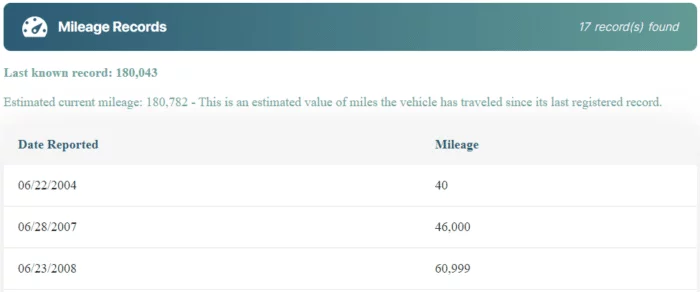
Mileage Records
See every recorded reading on your Lincoln, from first to latest. Verify accuracy, compare to service stamps, and avoid misrepresented listings to negotiate smarter and safeguard resale.
Warranty Status/Coverage
Buying a used Lincoln? This section confirms whether factory coverage still applies to you as the new owner. Confirming coverage protects you from unexpected expenses.
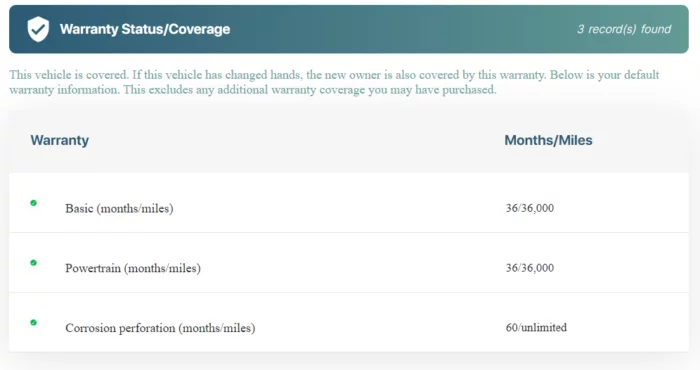
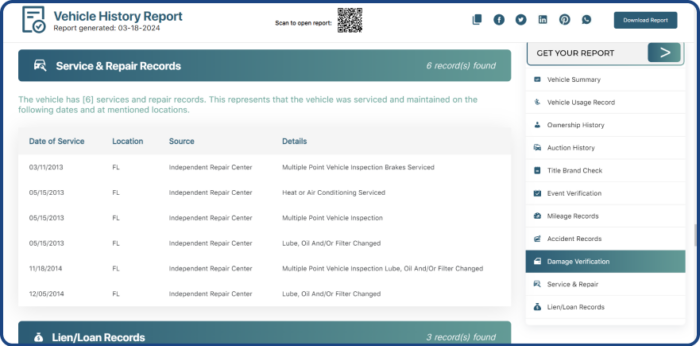
Service History
Check the Service history of any Lincoln. It gives you information regarding the type of service, with dates &service center (when available), and if the vehicle was maintained well.
Ownership History
See the Lincoln owner count, states, and exact dates. Verify “one-owner” claims, spot quick flips, and judge care level. Helping you negotiate smarter and buy with confidence using our full report.
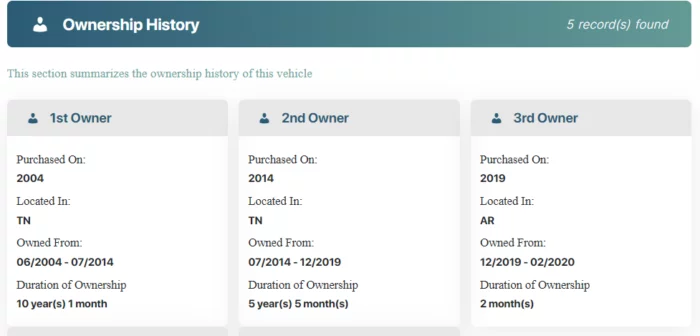
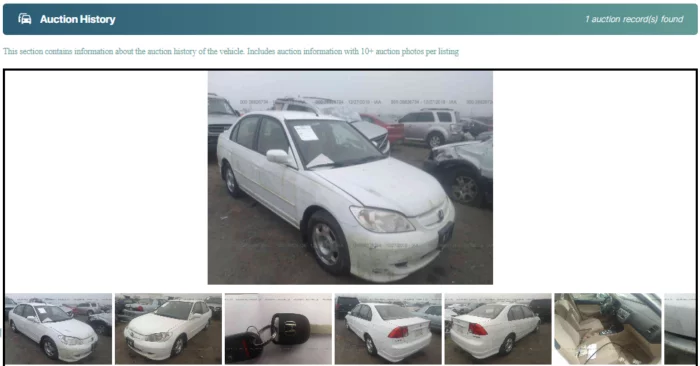
Auction History
See if your Lincoln ever sold in an auction! Use auction price, date, location, and condition to benchmark against current listings, estimate rebuild costs, and negotiate confidently.
Title Check
Quickly see if the Lincoln vehicle carries salvage, rebuilt, flood, fire, lemon, or odometer brands. A clean title supports financing, insurance, resale, and recall repairs.
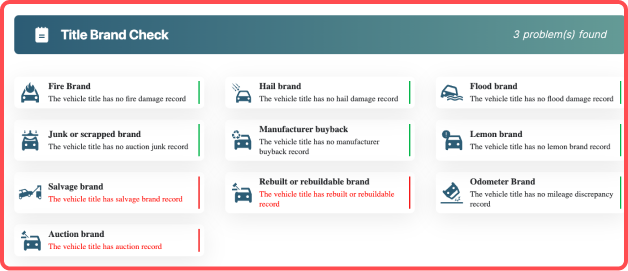
Common Issues Leading to Lincoln Recall
Lincoln vehicles have faced several recalls due to safety and reliability concerns. Common issues include fire or thermal risk, loss of braking ability, power loss, electronic display issues, and other notable issues such as rearview camera failure.
Below are some of the causes behind the Lincoln recall notices:
Fire or Thermal Risk
Engine Block Heaters
When an engine block heater overheats, it can spark an under-hood fire, even while your Lincoln is parked.
In May 2025 (NHTSA 25V-343), Ford recalled select 2024–2025 Lincoln Nautilus and 2023 & 2025 Lincoln Corsair models with 1.5L/2.0L MPC engines. Because of design/installation angles, air/coolant vapor around the heater element, driving temperatures up when plugged in.
Owners are told not to plug in the heater until dealers install a redesigned unit. This follows older block-heater recalls, including 2016 MKC (16V-183) and 2018 wire splice corrosion (18V-894), showing this hazard isn’t new.
Short-Circuit LED Logo Lights
In March 2025, Lincoln recalled more than 35,300 of the 2015–2017 Navigator SUVs after the LED logo lights in the side mirrors could short-circuit, overheat, and spark an under-hood fire. The root cause is moisture intrusion and corrosion in the mirror logo lamp circuitry that can bypass short-detection.
Dealers will disable the logo lamps and inspect related wiring for free. Until repaired, avoid using the mirror logo lights and park outside if you notice heat or smoke.
Loss of Braking Ability
Rear Brake Hoses Defects
In late August 2025, Ford disclosed that certain rear brake jounce hoses on 2016–2018 Lincoln MKX can rupture prematurely. Drivers might feel extra pedal travel or see the red brake warning light, which is a sign of brake fluid loss and longer stopping distances. Until repaired, stay alert for leaks and book an inspection when notified.
Leaking Brake-Fluid Loss
Lincoln vehicles have faced multiple brake fluid leak recalls that can lengthen stopping distances, posing a serious crash risk.
On August 28, 2025, NHTSA posted 25V544 for 2016–2018 Lincoln MKX (and 2015–2018 Ford Edge) due to rear brake jounce hoses that can rupture, causing fluid loss and a soft pedal.
Earlier, in May 2025, the 25V314 notice covered the 2022–2024 Lincoln Navigator because front brake lines may rub the air-cleaner outlet pipe, leak fluid, and reduce front-brake power.
Dealers will inspect, replace, or re-route parts for free. For the MKX model, parts are slated for 2026. Owners should check the VIN, watch for soft pedal or warning lights, and arrange free repairs.
Electronic Brake Booster (EBB) Malfunction
In August 2025, Ford recalled 2025 Lincoln Navigator SUVs because the Electronic Brake Booster (EBB) software can enter a faulted state while driving or when advanced driver-assist systems (ADAS) are active, briefly cutting power-brake assist. Drivers may see warning lights and feel a harder pedal; braking still works, but requires more force.
As a remedy, Ford delivers a no-cost EBB software update, available OTA or at dealers.
Sudden Engine Shutdown / Power Loss
Low-Pressure Fuel Pump Failures
In July 2025, Ford announced a major recall after the low-pressure fuel pump could fail and stall the engine. Covering more than 850,000 Ford and Lincoln vehicles, including 2021–2023 Aviator and 2021–2022 Navigator. The defect is tied to jet-pump contamination and tight internal clearances, with failures more likely in warm weather or low fuel.
Until the free dealer repair is finalized, monitor for hesitation, misfires, or warning lights. This is a safety recall. Check your VIN and plan a service.
Electronic Display Issues
Instrument Clusters Go Blank
Lincoln reported multiple issues where a display or instrument cluster goes blank, hiding the speedometer and warnings, resulting in a crash risk.
In June 2025, the 2024 Nautilus was recalled under 25V337 / 25C21 after the IVI module could reboot and blank the display, even removing the rear-view image in reverse; a software update to v1.1.3.2+ is the cure.
Previously, in February 2025, the 2025 Corsair was recalled under 25V049 / 25C02 because the instrument panel cluster might not illuminate; Lincoln replaced the IPC as the repair. Both repairs are free.
Other Notable Issues
Rearview Camera Failure
Some Lincoln vehicles can show a black, frozen, or distorted rear image. The most recent recall is caused by the APIM software fault that can wipe or delay the image. In April 2025, some 2015–2017 Navigator and 2015–2019 MKC were recalled due to the cameras having loose/damaged connectors.
Loose Or Detached Trim
In June 2025, Ford told NHTSA that some 2020–2025 Aviator SUVs left the factory with adhesive applied under insufficient pressure, weakening the bond on the C-pillar appliqué and rear window division bar. Ford is recalling about 132.9k vehicles, which include Lincoln. The dealer will secure or replace the trim at no cost.
Loose Seat Switches
In June 2025, Ford recalled over 304,600 vehicles, including 2020–2025 Lincoln Aviator and Ford Explorer, due to improperly installed trim pieces around the second-row seat release switches. The faulty bezel can cause the switch to stick in the down position, resulting in unexpected seat folding or sliding while driving, creating a crash risk.
Understanding the Lincoln Recall Process
The NHTSA begins the recall process by investigating reported issues. If a defect is found, the manufacturer must issue a recall. See the steps of their process below.
Report the Problem
Feel something’s off for your brakes, displays, camera, or wiring? Tell NHTSA. Many voices create momentum. Your report enters their database; when many Lincoln owners cite the same issue, it can trigger an official investigation.
Investigation
After a Lincoln-related complaint is filed, NHTSA runs a staged review to decide if a recall is warranted.
- Screening: Owner complaints are checked for credibility, supporting evidence, and patterns across Lincoln VINs.
- Analysis: Conducts a formal defect review; outcomes (including denials) are documented publicly in the Federal Register.
- Investigate the Issues: When Lincoln’s safety concerns are confirmed, NHTSA launches a formal investigation, ending in either no defect or a recall.
- Recall Management: NHTSA ensures owners are notified and monitors repair completion rates.
Recalls
When a Lincoln model or component creates a safety risk or breaks federal rules, the automaker alerts owners and supplies a no-cost fix. Most actions are voluntary and resolved at dealers. Remedies may include repair, replacement, refund, or buyback.
For peace of mind, run a VIN recall check and use our Detailed Vehicle History report to see dates, parts, and completion status in one place.
How Lincoln Vehicle Recalls Are Handled?
When a safety issue occurs in a Lincoln, three key groups are involved in the recall process: the manufacturer/ automaker, NHTSA, and you, as the vehicle owner. They work together to detect defects, notify drivers, and ensure repairs are completed to keep vehicles safe.
Automaker Role
Ford, as Lincoln’s parent company, initiates, funds, and manages recalls under NHTSA rules, paying for repairs and partnering with Lincoln/Ford dealers to make things right. Defects are spotted through factory checks, owner complaints, or NHTSA investigations.
When a defect is confirmed, Ford must file with NHTSA, notify owners, and deliver a no-cost remedy, such as repair, replacement, or refund, through authorized Lincoln/Ford dealers, then report progress quarterly.
NHTSA’s Role
The NHTSA oversees Lincoln recalls, ensuring Lincoln provides free and effective repairs. They monitor compliance, track progress, and safeguard drivers and passengers from potential safety risks.
Your Role as the Vehicle Owner
Your role is simple but vital: watch, report, verify, repair, document. If your Lincoln shows warning lights, odd noises, weak brakes, or screen failures, file a complaint with NHTSA and check your VIN for open recalls.
When a notice arrives, book an appointment with a Lincoln/Ford dealer for free repair. Until fixed, follow any safety guidance (e.g., don’t plug in a block heater). After service, keep invoices and recall completion paperwork for insurance and resale.
Get Lincoln Window Sticker by VIN
A Lincoln window sticker by VIN reveals what the vehicle shipped with: MSRP, packages, colors, safety/driver-assist features, and fuel-economy ratings.
Cross-check against current equipment to spot deletions or upgrades, support appraisal values, and strengthen your maintenance or insurance records. Add it to your recall results for total clarity.
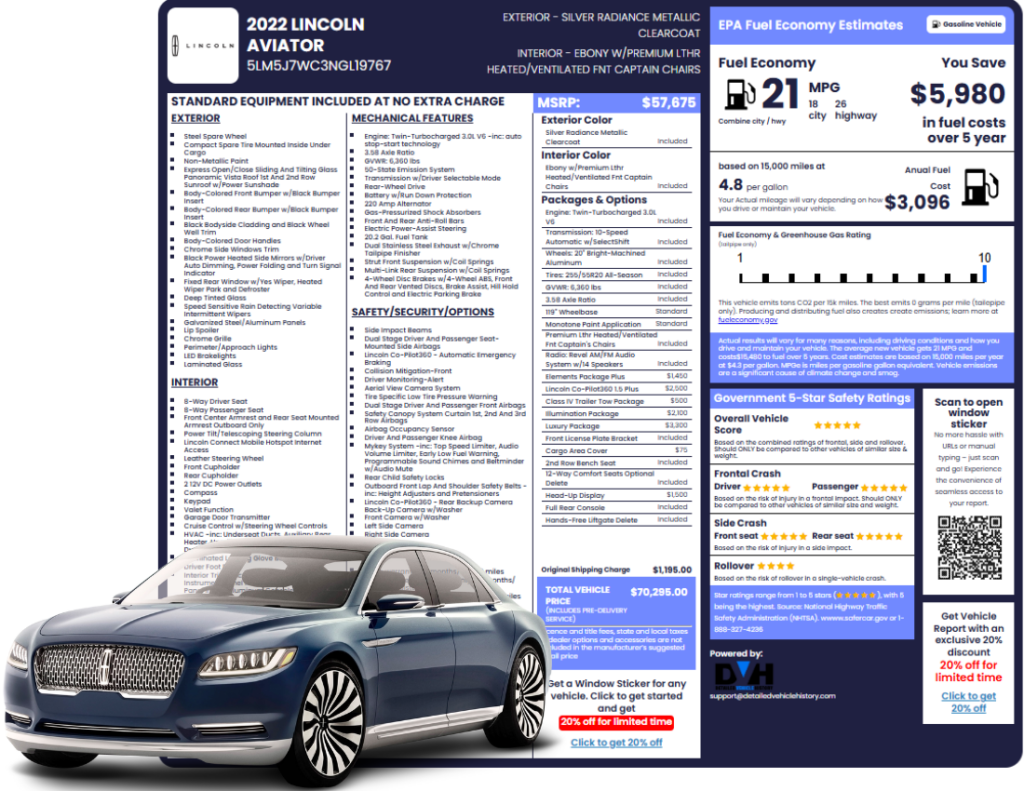
Why Use Detailed Vehicle History to Check Lincoln Recall?
Shopping or simply staying safe? Our Lincoln vehicle report packages include recall status alongside the mileage records, warrant status/coverage, theft records, ownership records, and more.
It’s everything you need to verify safety, confirm stories, and negotiate price. Choose Detailed Vehicle History for reports built to be read, understood, and acted on. Enter your Lincoln VIN or license plate and get clarity that lasts long after the test drive.
Recall Check For Others Manufacturers
FAQ about Lincoln Recalls Check
How do I check for recalls on my Lincoln by VIN?
For a complete recall check on your Lincoln, use Detailed Vehicle History by entering your VIN or license plate. We show you recalls and provide valuable insights like mileage records, warranty status/coverage, theft records, ownership records, and more for better-informed decisions.
Do Lincoln recalls cost money, and where are they repaired?
Lincoln recalls are typically free to fix. Once you receive notification of an open recall, Lincoln will repair the issue at no cost to the owner, including part replacements and necessary inspections at the authorized Dealer.
Always check your VIN for the latest Lincoln recall status to stay updated.
Is it safe to drive my Lincoln if a recall is open?
An open recall means a safety defect exists, but not every recall requires you to stop driving. NHTSA will state when a vehicle should not be driven (for example, urgent Takata air-bag “Do Not Drive” warnings).
If your notice lacks that language, schedule the free fix promptly and limit trips to the dealership.
Can a dealer sell a used Lincoln with an open recall?
There’s no federal law stopping dealers from selling used vehicles with open recalls, though it’s illegal to sell new ones that way, and rental fleets can’t rent recalled cars.
Some dealers fix recalls pre-sale as policy, but you should confirm status with a Lincoln Recall check by VIN and make repair completion a condition on your purchase.
How fast will Lincoln fix my recall, and can parts delays affect me?
It depends on the fix. Software recalls can be quick; many Lincolns receive over-the-air (OTA) or dealer updates within days.
Hardware recalls often take longer because parts must be engineered and shipped; some campaigns announce interim letters now and final parts months later (e.g., MKX rear brake hoses 25V544 with parts targeted for 2026). So yes, parts delays are affecting the recall time.
Will a Lincoln recall affect resale value, insurance, or warranty coverage?
Resale value: Shoppers and dealers often discount cars with open recalls; the value impact usually fades once repaired. Certified programs generally won’t accept open-recall vehicles.
Insurance: Coverage typically continues, but fix promptly per safety guidance.
Warranty: Recalls are no-cost, regardless of warranty status; they’re not counted against your warranty.
Tip: Close recalls before listing or trading your Lincoln.
What’s the difference between a Lincoln recall, a service campaign, and a TSB?
If it’s a recall, your Lincoln has a safety/compliance defect, and the manufacturer must notify you and repair it free.
If it’s a service campaign, Lincoln or Ford is offering a goodwill or quality fix outside of a safety recall. The service campaign is generally free but usually time-limited.
If it’s a TSB, the automaker has sent instructions to dealers for diagnosing a recurring issue; it’s not mandatory and not automatically free unless covered by warranty.
How do I check recalls on a classic or imported Lincoln with limited records?
For a complete recall check on your classic Lincoln, use Classic Car VIN Lookup by Detailed Vehicle History.
We show you recalls and provide valuable insights like mileage records, warranty status/coverage, theft records, ownership records, and more for your Classic Lincoln decisions.

